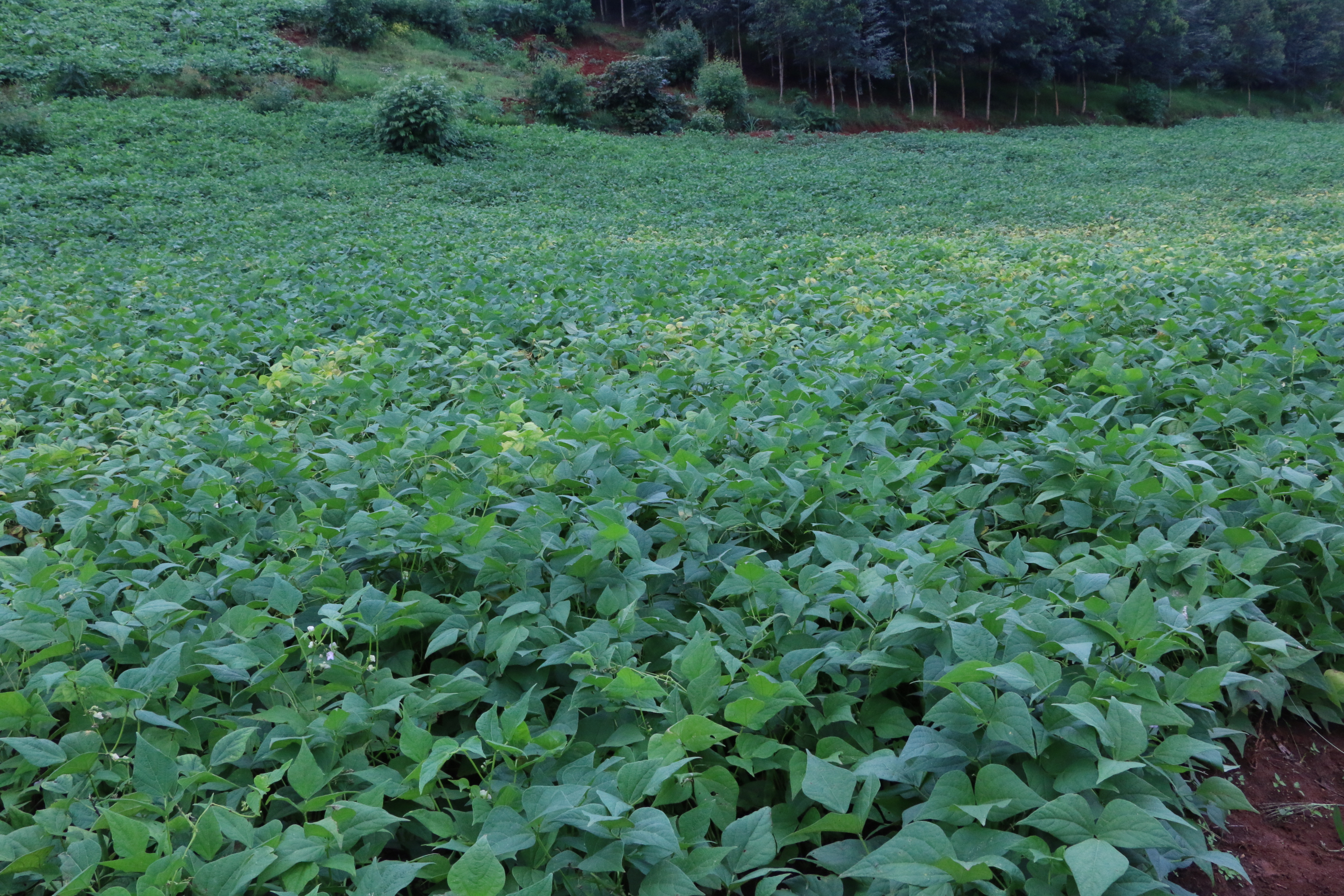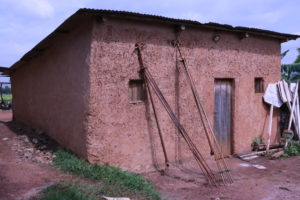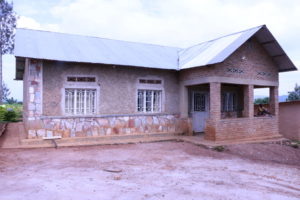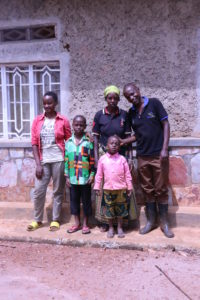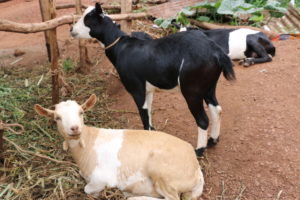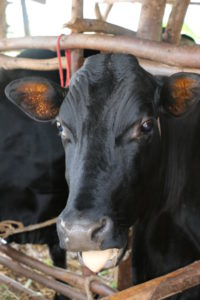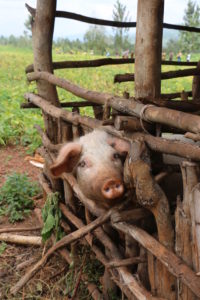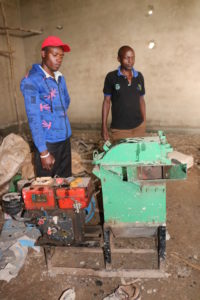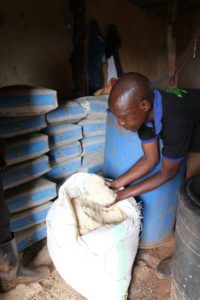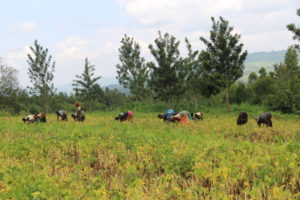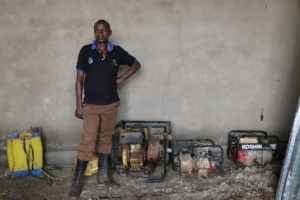Walking down Kwamagana town in Rwanda, we find Alexis Nzeyimana on a motorcycle by one of his plots. Nicknamed ‘Rukirigitafaranga’, meaning tickling money in Kinyarwanda, Alexis has three farm sites on a 27 hectares piece of land, eight of which he owns and 19 he rents at 200,000 Rwandan Francs per hectare annually in Karembo sector. Alexis is listed by Rwanda Agriculture Board (RAB) and HarvestPlus as one of the certified farmers and has been farming for the past six years. He grows RWR2245, a 75-day maturing bean variety developed by PABRA. The bush bean variety of bean was supplied to him by HarvestPlus.
At the end of the season, Alexis is required to give back the same amount of grain he got from HarvestPlus. in between the season, RAB extension officers visit Alexis’ farm and train him on proper farm techniques. They also inspect his farm for pests and diseases. The first of his three sites are close to a swamp and are doing well. He rotates the crops between maize and beans in the farm often. “Rotation is very important. It helps with disease management, increases biomass fertilizer for the other plants and also ensures enough food for my family,” he stressed.
His second planting site is 2.8 kilometers away. This is where Alexis and his family, his wife Mrs. Nyirangendahimana, 21-year-old daughter Icyimpaye, 7-year-old son Icyerekezo and 4-year-old son Giramata live. The family used to live in a small mud house but since Alexis started working with RAB and HarvestPlus, the profit from the beans has allowed them to build a stone mansion.
He is able to pay his children’s’ fees in a private school. One is in secondary school and the other two are in primary school.
He has also saved enough money to buy livestock for his farm. He rears pigs, goats, and cows to substitute his income and has increased the organic fertilizer as well as produce manure for biogas to give light to his home. His cows give him enough milk to complement his children’s diet.
A variety of livestock on Alexis’ farm
Alexis is also in the process of completing a 20-meter by 9-meter storehouse for his produce. In the store, we find a grinder that he uses to chop bean and maize stocks. He grinds the stocks to a flour-like consistency to feed it to his cows and sell the surplus to his neighbors. He bought the machine in 2016 at 1.2 million Rwanda Francs from the sale of beans.
Alexis uses the grinder in picture 1 to chop dry maize and bean stocks into a fine flour as displayed in picture 2 to feed livestock
We find a group of ladies weeding on his second farm. Alexis explains that the ladies are part of a cooperative he constituted. The name of the cooperative is Imbarutso za Karembo which means the trigger of Karembo sector. Started six years ago as a demonstration plot, the cooperative has grown to a 163-member cooperative with 91 women and 72 men, one of them being his wife. Mrs. Mukamagambo M. Consolate, secretary of the cooperative is thankful to Alexis for starting the cooperative. She says that since its inception, all the members have not had to hire labor to work on their farms. They rotate and work on each other’s farms. It also helps them access seed and fertilizer from their agro-dealer and chairman, Alexis, who gives them seed for planting with the expectation of the same amount of seed at the end of the season, as well as fertilizer at a subsidized price. The cooperative is considered exemplary and has become a source of knowledge and information to outsiders who want to copy the method they use. The cooperative is also able to buy seed from neighboring farms and sell to HarvestPlus at a better price which gives them better income.
This money helps to give loans to members in need especially when paying school fees and for the annual national health insurance, Mitiweli paid in June of every year. Members of the cooperative also have a chance to learn from each other, especially better farm practices and methods of increasing yields on their farms.
Alexis takes us to his last planting site, 4.5 kilometers from his second planting site. A sad Alexis points out that the site was severely affected by the drought in Rwanda in 2017. As he pointed out the severity of the drought to a visiting RAB official, he informed Alexis that the government of Rwanda is in the process of setting up crop insurance to mitigate farmer losses from natural disasters.
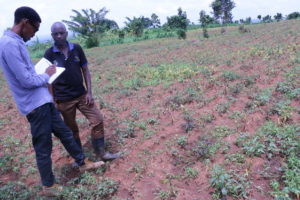
Alexis explains the extent of the drought on his farm to a visiting RAB representative. Behind him is his drought affected farm.
Alongside getting government insurance, Alexis has purchased 3 generators to pump water from the river near his first site. The generators, one of which is a diesel powered and the two others electric will supply water to his site at home. This will help mitigate the effects of the drought both on his farm and his household.
Alexis also owns a seed company where he produces biofortified maize and bean seed for sale. Last season, he produced 33 tons of seed that HarvestPlus considered viable and bought. He also produced 8 tons consumption grain, 7.3 tons of which he sold to the local market and the rest is used for family consumption. Alexis weeds his farm 3 times with the help of the members of the cooperative and applies foliar, flowering and DAP fertilizers. A grateful Alexis has seen the benefits of working on the certified seed with HarvestPlus and RAB, especially with the PABRA developed RWR2245, which has helped him get better yields and make a bigger income for his family.


